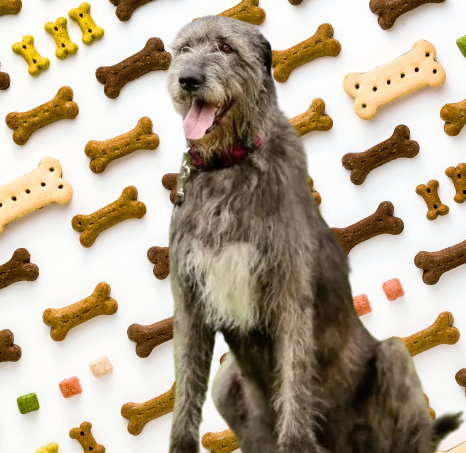Welcome to Dog Training Newbies !
Welcome to Dog Training Newbies !

Irish Wolfhounds are magnificent and gentle giants that have captured the hearts of many dog lovers. While they are generally a healthy breed, like all dogs, they can be prone to certain health concerns. Understanding these common issues and taking preventive measures can help ensure the well-being and longevity of your beloved Wolfhound. In this article, we will explore the health concerns commonly seen in Wolfhounds and provide insights into preventive care measures that can be taken to keep them happy and healthy.
GASTRIC DILATATION-VOLVULUS (GDV) OR BLOAT
One of the most serious health concerns in Wolfhounds is Gastric Dilatation-Volvulus (GDV), commonly known as bloat. This condition occurs when the stomach fills with gas and twists on itself, leading to a life-threatening emergency. Signs of bloat include restlessness, unproductive attempts to vomit, distended abdomen, and rapid breathing. Immediate veterinary attention is crucial if bloat is suspected. To help prevent this condition, it is important to feed Wolfhounds smaller, frequent meals, avoid rigorous exercise before and after meals, and monitor their eating habits closely.
HIP DYSPLASIA
Like many large breeds, Wolfhounds are prone to hip dysplasia, a condition where the hip joint doesn't develop properly. This can result in pain, lameness, and arthritis. While hip dysplasia has a genetic component, environmental factors such as nutrition, exercise, and weight management also play a role. Regular exercise on soft surfaces, maintaining a healthy weight, and providing a balanced diet can help reduce the risk of hip dysplasia. Responsible breeders perform hip evaluations on their breeding dogs to minimize the occurrence of this condition.
HEART DISEASE
Heart disease, particularly dilated cardiomyopathy (DCM), is a concern in Wolfhounds. DCM is a condition where the heart muscle becomes weakened, leading to enlargement and reduced ability to pump blood effectively. Regular veterinary check-ups, including heart screenings, can help detect early signs of heart disease. A heart-healthy diet, exercise appropriate for their size and age, and supplementation with essential nutrients like taurine may aid in maintaining heart health.
OSTEOSARCOMA
Osteosarcoma, a type of bone cancer, is seen more frequently in large and giant breeds, including Wolfhounds. Signs of osteosarcoma may include lameness, swelling, and pain in the affected limb. Early detection is crucial for treatment options. While prevention is challenging, maintaining a healthy weight and providing a balanced diet can contribute to overall well-being and potentially reduce the risk of certain cancers.
HYPOTHYROIDISM
Hypothyroidism is a hormonal disorder that affects the thyroid gland, leading to a decrease in thyroid hormone production. Symptoms include weight gain, lethargy, hair loss, and skin issues. Regular thyroid function testing can help identify hypothyroidism early. Treatment typically involves lifelong thyroid hormone replacement therapy, under veterinary guidance. Regular exercise, a nutritious diet, and maintaining a healthy weight can support thyroid health.


PREVENTIVE CARE MEASURES
In addition to being aware of common health concerns, there are several preventive care measures that can help keep your Wolfhound in optimal health:
1. Regular Veterinary Check-ups: Routine veterinary visits are essential for early detection of any health issues. Vaccinations, dental care, and parasite prevention should be included in the regular check-up schedule.
2. Balanced Diet: Provide a high-quality, age-appropriate diet that meets the nutritional needs of your Wolfhound. Consult with your veterinarian to determine the best feeding regimen for your dog's specific requirements.
3. Weight Management: Obesity can exacerbate health issues. Maintain a healthy weight through portion control, a balanced diet, and regular exercise suitable for your Wolfhound's size and age.
4. Exercise and Mental Stimulation: Regular exercise is important for Wolfhounds to maintain muscle tone, mental stimulation, and overall well-being. However, avoid excessive exercise during rapid growth stages to prevent joint and bone issues.
5. Dental Care: Brush your Wolfhound's teeth regularly and schedule professional dental cleanings as recommended by your veterinarian to prevent dental diseases.
6. Grooming: Regular grooming, including brushing and nail trimming, helps maintain healthy skin, coat, and overall cleanliness. Check ears regularly for signs of infection and clean them as needed.
Being aware of the common health concerns in Irish Wolfhounds and taking preventive care measures can significantly contribute to their overall well-being and quality of life. Regular veterinary check-ups, a balanced diet, weight management, exercise, and maintaining good dental hygiene are vital aspects of preventive care. By staying proactive and attentive to your Wolfhound's health, you can help ensure that they live a long, happy, and healthy life as a cherished member of your family.